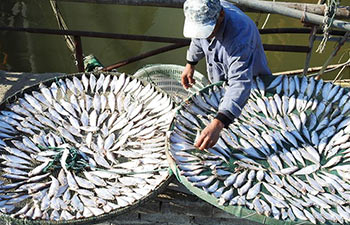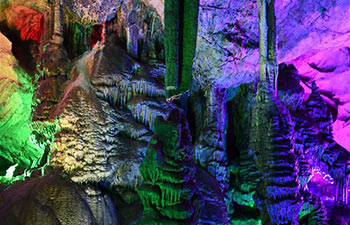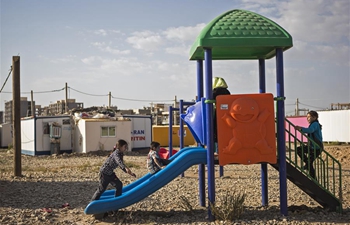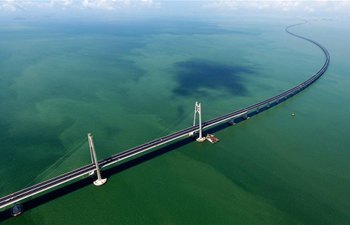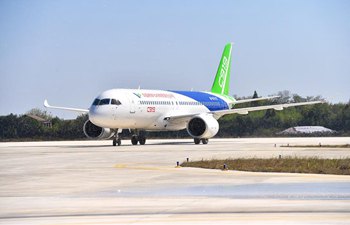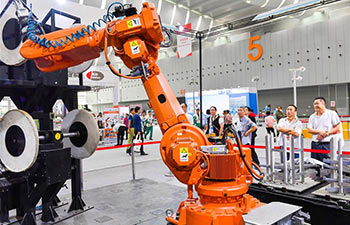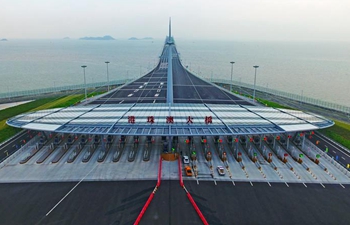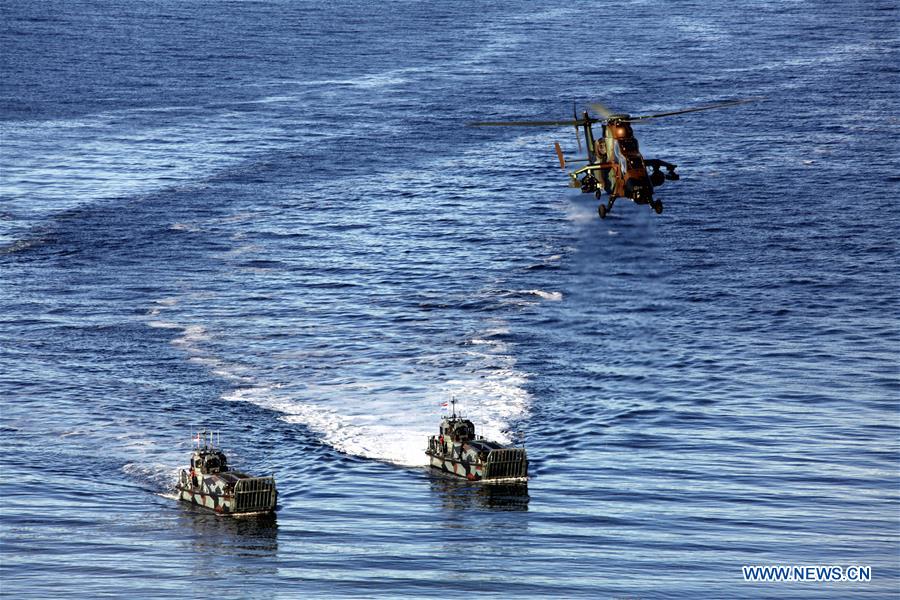
Vessels and a helicopter take part in the Trident Juncture 2018 exercise at a waterfront site near Trondheim, Norway, Oct. 30, 2018. NATO on Tuesday showcased its air, sea and land forces in a high-profile demonstration as part of its biggest military exercise since the end of the Cold War in Norway amid escalating tension with Russia. (Xinhua/Liang Youchang)
TRONDHEIM, Norway, Oct. 30 (Xinhua) -- NATO on Tuesday showcased its air, sea and land forces in a high-profile demonstration as part of its biggest military exercise since the end of the Cold War in Norway amid escalating tension with Russia.
The hour-long joint demonstration with various military scenarios, held at a waterfront site near Trondheim in central Norway, was a show of forces before NATO dignitaries, foreign observers and the international press.
"We are facing the most challenging security environment in a generation. And NATO has responded with the biggest adaptation of our collective defence in a generation," NATO Secretary General Jens Stoltenberg told a joint press conference with Norway's Minister of Defence Frank Bakke-Jensen before the demonstration.
The Trident Juncture 2018 exercise, which started on Oct. 25 and runs through Nov. 7, involves around 50,000 participants from all 29 NATO members and its partners Sweden and Finland, with about 250 aircraft, 65 vessels and up to 10,000 vehicles.
Russia has complained that the levels of military activities conducted by NATO near Russian borders have been higher than ever since the Cold War.
ESCALATING TENSION
Stoltenberg said NATO was notified last week that Russia plans to test missiles this week in the international waters of the North Atlantic west of Norway, in the vicinity of where NATO is carrying out the massive exercise.
"I expect Russia to behave in a professional way and it will not change the plans of our exercise," Stoltenberg said.
According to Norway's local media, the country's civil airport operator Avinor has been informed by Russian aviation authorities of the missile tests that will take place on Nov. 1-3.
Julie Wilhelmsen, a senior research fellow at the Norwegian Institute of International Affairs, thought that the exercise "fits into a pattern of escalating tension between Russia and NATO in Europe following the crises in Ukraine in 2014."
"There has been military posturing, increasing numbers of military exercises and movement of troops and military installations closer to the border of the other party," she said.
The Russian Foreign Ministry said last week that the NATO drills in Northern Europe are obviously anti-Russian and they will lead to a deterioration of the military and political situation in the region.
"Russia does not seem to believe that NATO's intentions are defensive and interprets the increasing activity in Norway as a threat to its core military assets in the North," Wilhelmsen said, citing examples of the stationing on a rotational basis of U.S. Marines in Norway and the ongoing exercise.
She believed that Russia is not likely to "step back" in the face of an increasing U.S. military presence closer to its border and the mood in Moscow is such that it will fight back to secure what it deems to be core security interests.
NEW COLD WAR?
As relations between Russia and the West are at a new low, there is a lot of talk of a new Cold War between the two sides, comparing the current escalating tension to the geopolitical rivalry between the Soviet Union and the West from 1947 to 1991.
Wilhelmsen shared the concerns and thought the new tension is shaping relations in Northern Europe.
"Following the crises in Ukraine most people thought that the North, having been a unique and collaborative space for many years, would not be affected by the rising tension between NATO and Russia in any significant way," Wilhelmsen said.
"Today, unfortunately, I think we have to say that what some people call the New Cold War is shaping relations in Northern Europe in a fundamental way," she said.
The NATO chief, however, wanted to downplay the tension between Russia and the West.
"We are not in a Cold War situation, but we are exercising collective defence," Stoltenberg said at the press conference. "There are big differences between now and the Cold War."
"During the Cold War, you had two military blocs confronting each other, the Warsaw Pact and NATO. You had hundreds of thousands of combat-ready troops on both sides, along the east/west border in Europe," he said. "And you had tens of thousands of nuclear weapons in Europe."
"So, that was a very different situation compared to what we have today. What we see today is a more unpredictable situation, where it's harder to foresee exactly what will happen and there is less agreement on what are the rules of the game," Stoltenberg said.
